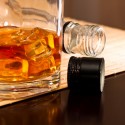Swiss vote on radical heroin rules
Voters in Switzerland go to the polls on Sunday to decide whether to make a controversial heroin prescription programme a permanent, nationwide health policy.
The Swiss government supports the idea but opponents say it encourages drug addiction, and sends the wrong message to young people.
Throughout the 1980s and early 1990s Switzerland had one of the highest rates of heroin addiction in Europe.
Open drug scenes in cities such as Zurich, Basel and Bern were common, with addicts injecting and dealers selling publicly in the streets and parks.
Users often shared needles, leading to a sharp rise in HIV infection rates, and in the spread of Hepatitis.
In an attempt to reduce the spread of such diseases, if nothing else, the Swiss health department began introducing needle exchanges, followed by clean injection rooms where addicts could take heroin in a safe environment, supervised by a nurse.
For many health professionals, the next logical step was to start prescribing heroin to those addicts, many of them already ill, who really did not seem able to get off drugs.
In 1998 Switzerland introduced an experimental 10-year heroin prescription programme. Today around 1,300 patients across the country are on the programme.
Dr Christoph Buerki says his clinic in Bern serves 210 such patients.
“Their average age is 40 now, and they have an average of 13 years of heroin addiction before they enter this programme. Basically we are aiming at a group of people where everything else has failed,” he says.
Chronic addiction
Dr Buerki’s patients have to have tried abstinence treatments at least twice before being eligible for heroin prescription.
The majority have also tried and failed to stay on a methadone maintenance programme. Methadone in fact remains the more common maintenance treatment in Switzerland, with over 16,000 patients.
“I thought this was just the lowest of the low but, well, I am an addict. And I’ve got a job now, and two sons, so I live a pretty normal life.
“My kids just know that Dad is sick and has to take medicine every day, that’s all.”
And Dr Buerki shares the view that long term addicts like Jan are actually ill, and need to be treated as such.
“These are patients with a chronic, relapsing disease that might go with them for the rest of their lives,” he says.
But opponents of heroin prescription, like Sabine Geissbuhler of the association Parents Against Drugs, say that attitude is exactly what is wrong.
“When heroin prescription was first introduced, it was touted as a ‘treatment’,” she says.
“But treatment means the goal should be people get off drugs eventually – they stop being addicts – and that’s just not happening.”
“It’s an outrage,” she continues, “that the state should give addicts heroin – it’s poison. You don’t give people poison to make them better.”
A life worth living?
“It would be more shocking if we just let them die,” counters Maria Chiara Saraceni, a drugs policy expert with the Swiss federal health department.
“It’s the government’s responsibility to help everyone, and not to judge them.
“If this is what they need to live a more stable life, and to get off the streets, then that is what we should offer.”
But Ms Geissbuhler is not convinced.
“That’s not a life,” she insists. “I have four children, and I would never, never, put them into a heroin prescription programme. What kind of freedom is that? I’d rather they were dead.”
But whether a life is worth living or not can be a very personal, subjective thing.
Jan, who leaves the clinic every day to go to work, then returns in the evening for a second injection before picking up his son from nursery, views his life as normal, and even contented.
“I’m just like everyone else,” he insists. I get up in the morning, I go to work, I do my job responsibly, I go home to my family in the evening. And at the weekend I’m the Dad my kids want me to be.”
But the fact remains that Jan may well be on heroin for the rest of his life.
Very few patients on the programme have so far managed to get off the drug for good, and in that sense heroin prescription does not fit with Switzerland’s chief goal on drug use, which is abstinence.
Doctors like Christoph Buerki accept that their patients will be with them for many years to come. Instead he points to another, unexpected side effect of the programme.
“Heroin was a very ‘in’ and fashionable thing to do in the 1980s and early 1990s,” he explains. “But now people who take heroin have the image of losers, of junkies.
“I mean look at this place,” he says, gesturing to his small, rather run-down clinic, and the lines of patients, most of them middle aged, waiting for injections.
“Nobody thinks this is a good thing – it’s not cool to go to a clinic like ours to get heroin twice a day.
“We’ve medicalised heroin in Switzerland – it has the image of an ugly illness, and that is why, I think, numbers of new addicts are falling.
Very few young people are turning to heroin in Switzerland these days.”
And that is the argument that may well sway many Swiss voters.
Keeping hundreds of people on heroin through old age and right to the ends of their lives is a rather shocking prospect, but polls suggest the Swiss may accept it, if it means their streets are free of illegal drug use, and their young people see heroin not as a glamorous rock star’s drug, but as a sad, banal, old people’s habit.
Story from BBC NEWS:
